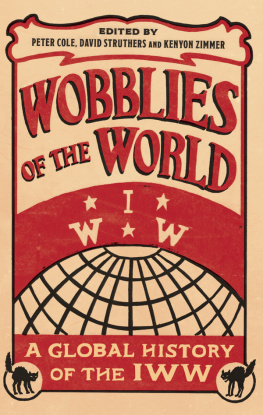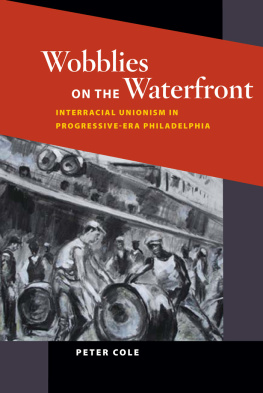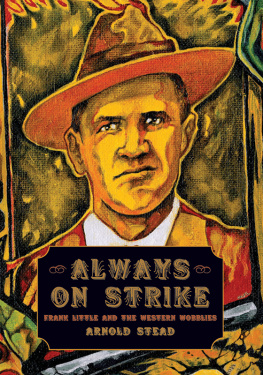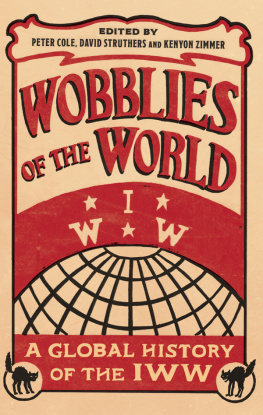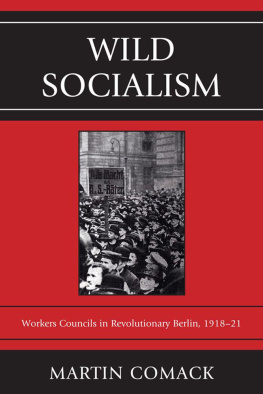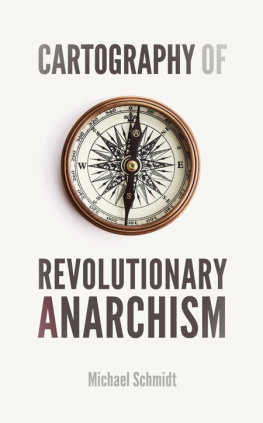WOBBLIES OF THE WORLD
Wildcat: Workers Movements and Global Capitalism
Series Editors:
Peter Alexander (University of Johannesburg)
Immanuel Ness (City University of New York)
Tim Pringle (SOAS, University of London)
Malehoko Tshoaedi (University of Pretoria)
Workers movements are a common and recurring feature in contemporary capitalism. The same militancy that inspired the mass labour movements of the twentieth century continues to define worker struggles that proliferate throughout the world today.
For more than a century labour unions have mobilised to represent the political-economic interests of workers by uncovering the abuses of capitalism, establishing wage standards, improving oppressive working conditions, and bargaining with employers and the state. Since the 1970s, organised labour has declined in size and influence as the global power and influence of capital has expanded dramatically. The world over, existing unions are in a condition of fracture and turbulence in response to neoliberalism, financialisation, and the reappearance of rapacious forms of imperialism. New and modernised unions are adapting to conditions and creating class-conscious workers movement rooted in militancy and solidarity. Ironically, while the power of organised labour contracts, working-class militancy and resistance persists and is growing in the Global South.
Wildcat publishes ambitious and innovative works on the history and political economy of workers movements and is a forum for debate on pivotal movements and labour struggles. The series applies a broad definition of the labour movement to include workers in and out of unions, and seeks works that examine proletarianisation and class formation; mass production; gender, affective and reproductive labour; imperialism and workers; syndicalism and independent unions, and labour and Leftist social and political movements.
Also available:
Just Work? Migrant Workers Struggles Today
Edited by Aziz Choudry and Mondli Hlatshwayo
Southern Insurgency: The Coming of the Global Working Class
Immanuel Ness
The Spirit of Marikana: The Rise of Insurgent Trade Unionism in South Africa
Luke Sinwell with Siphiwe Mbatha
Working the Phones: Control and Resistance in Call Centres
Jamie Woodcock
Wobblies of the World
A Global History of the IWW
Edited by Peter Cole, David Struthers,
and Kenyon Zimmer

First published 2017 by Pluto Press
345 Archway Road, London N6 5AA
www.plutobooks.com
Copyright Peter Cole, David Struthers, and Kenyon Zimmer 2017
The right of the individual contributors to be identified as the authors of this work has been asserted by them in accordance with the Copyright, Designs and Patents Act 1988.
British Library Cataloguing in Publication Data
A catalogue record for this book is available from the British Library
ISBN 978 0 7453 9960 7 Hardback
ISBN 978 0 7453 9959 1 Paperback
ISBN 978 1 7868 0151 7 PDF eBook
ISBN 978 1 7868 0153 1 Kindle eBook
ISBN 978 1 7868 0152 4 EPUB eBook
This book is printed on paper suitable for recycling and made from fully managed and sustained forest sources. Logging, pulping and manufacturing processes are expected to conform to the environmental standards of the country of origin.
Typeset by Curran Publishing Services, Norwich, England
Simultaneously printed in the United Kingdom and United States of America
Contents
Acknowledgments
Like many great ideas, this book was born while drinking beers with friends. The three of us were presenting papers on our different research projects during the 2008 conference of the Pacific Northwest Labor History Association. Dave and Kenyon already were friends and met Peter, for the first time, that rainy weekend in Vancouver. We vaguely discussed putting together a book on the history of the Wobblies around the world, but promptly forgot about our idealike many such grand alcohol-fueled notions. Over the next few years, we emailed each other intermittently, and even organized a panel on the topic at the 2012 meeting of the American Historical Association, but all of us were busy with various other work and life commitments. Eventually, in 2015, our lives converged, windows opened, the sun shone, and we finally undertook this project. From there, it moved surprisingly fast. We already knew many other folks, around the world, who shared our interest inor rather, fascination withthe Wobblies. We reached out to many of them and put out a call for papers to make sure we reached a wider network of scholars, both in the academy and outside of it, who studied the IWW .
We would like to thank every contributor to the book who (for the most part) submitted drafts on time, and all of whom were passionate about the project. We are proud of this book and trust everyone else involved is, too. We also thank one of the Wildcat series editors, Manny Ness, for his steadfast and enthusiastic support from the get-go, as well as the six anonymous reviewers who commented on the project. Thanks, also, to David Shulman at Pluto Press and the incredible team of committed, skilled workers who help this global publishing house spread the word about the Wobs and so many other important subjects, past and present.
Peter Cole thanks his partner, Wendy Pearlman, who listened to countless tales about the Wobblies (some of them even true), and provided moral and intellectual support; he also thanks his co-conspirators (um, co-editors) for their friendship and thoughtfulness. Dave Struthers thanks his wife Irina Shklovski for listening to him talk about the past, his daughter Freya for taking him to the skatepark, Devra Weber for first introducing him to the IWW in a labor history seminar, his co-plotters for making this collaboration a pleasure, and the contributors for keeping him excited every time he sat down to read drafts. Kenyon Zimmer thanks his wife Rafia Mirza for her support throughout, Salvatore Salerno for first introducing him to the hidden anarchist connections to the IWW , Robert Helms for taking time out of a visit to the International Institute of Social History in Amsterdam to scan rare documents for him, and his co-editors for their hard work, patience, and humor.
Finally, we would like to thank all of those, dead and alive, who keep the Wobbly flames burning. We know that Wobblies and fellow travelers are committed to a more just and equitable world. So are wethats why we imagined and, now, helped create this book. Thanks for reading!
Introduction
Peter Cole,
David Struthers, and Kenyon Zimmer
This book proudly proclaims itself the first-ever global history of the Industrial Workers of the World ( IWW , or Wobblies). In this collection of essays, 20 scholars from around the world begin a long-overdue conversation about the IWW as a global phenomenon. Although the unions official membership never was numerically as large as mainstream unions, its influence during its early years1905 into the 1920swas enormous in the United States, where it was founded, and worldwide. The IWW was part of a global upsurge of anarchism and syndicalism, which in the early twentieth century, before the Russian Revolution and birth of the Soviet Union, arguably occupied the central positions among the global Left as the dominant anti-capitalist ideologies. Subsequent scholarship focusing on western Europe and those leftist currents that fed into social democratic state structures has obscured the influence and vibrancy of anarchism and syndicalism around the world. Syndicalism envisioned replacing capitalism with a socialist economy, but simultaneously, maintained great suspicion of state power and centrally planned systems, and viewed the labor movement as the primary vehicle for revolutionary change. In every industrial and industrializing nation in the world, varieties of syndicalism emerged by the early twentieth century, but few were better known or more globally influential than the IWW s revolutionary industrial unionism.
Next page
